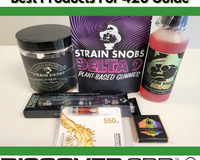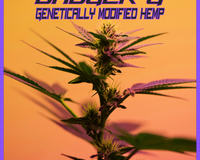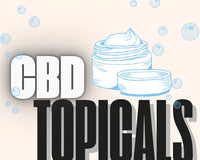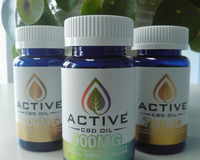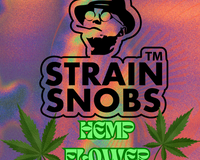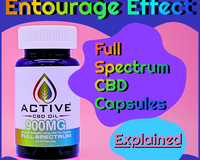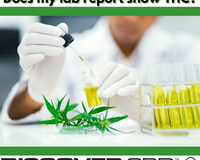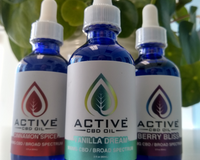To answer the question "can CBD be addictive" we have to first define addiction. An addiction is defined as a chronic behavior that is relapsing and compulsive and results in detrimental effects, both physical and mental, that are seen in those suffering from substance abuse or in any circumstance where the consumer is unable to consciously control their behavior with regard to the use of a product. This article discusses CBD addiction.
Are CBD products addictive?
Unlike some other cannabinoid compounds, such as THC, CBD has no psychoactive effects that interact with the brain centers that can give you a “high” therefore the risk of CBD (cannabidiol) addiction is unlikely. The World Health Organization has likewise concluded that cannabidiol does not have the potential for abuse or addiction. This is good news for all consumers who wish to use a natural substance for everyday afflictions.
The fact that marijuana and its high THC content is highly addictive is probably one reason to wonder if a CBD addiction exists. CBD infused gummies and tinctures have become increasingly popular in recent decades and the rise in popular demand for CBD primarily has resulted from its alleged psychological benefits. However some consumers will hesitate to use such products because of concerns CBD could cause addiction based solely on the relationship to marijuana.
Habitual use of CBD products does not produce drug addiction or common withdrawal symptoms when discontinued and can be used in many different forms including topical salves and lotions, capsules, and tinctures. So for those of you wondering if CBD is addictive, you can relax.
Does hemp oil have cannabinoids?
So where does CBD, or cannabidiol, come from? The vast majority of CBD products are manufactured from CBD derived from the leaves and flowers of the hemp plant which has a lower level of THC (the psychoactive portion of the cannabis plant) making it easier to process CBD in its purest form. Cannabinoids are defined as "any of a group of closely related compounds which include cannabinol and the active constituents of cannabis". The primary active cannabinoid in marijuana is THC whereas the primary cannabinoid in hemp is CBD. So the answer is yes, hemp oil does have cannabinoids.
Are CBD products legal?
The debates are more complex than simple. In hemp, there can still be natural traces of THC or tetrahydrocannabinol present. Because the THC in products marketed as CBD may not exceed 0.3 per cent for legal usage (in most states) the hemp cannabis sativa plant is used to produce CBD products.
Hemp cannabidiol is easy to produce and legal in all 50 states, or conditionally legal by federal law enacted by the Agriculture Improvement Act (also known as the 2018 Farm Bill) provided it contains no more than 0.3% THC thereby making it the most commonly used form of CBD used in commercial manufacturing.
Effects of CBD
Interestingly, CBD is a non-psychotropic drug with many benefits. Some studies have shown that CBD may help relieve chronic pain and inflammation as well as reduce anxiety and stress. The World Health Organization suggests CBD might treat conditions related to diabetes, arthritis, vascular disease or other conditions. This is all a result of the interaction of the CBD molecule and other cannabinoids and specific receptors found in the human body that are part of the endocannabinoid system.
Cannabinoids are a natural substance in our bodies and in plants. Endocannabinoids interact with neurotransmitters that attach to receptors and affect pain, mood, appetite, sleep, and how we behave or react. CBD is a commonly used cannabinoid within the cannabis plant, which is actually the flowering plant.
CBD use has increased dramatically over the past decade for everything from neuropathic pain to anxiety symptoms and relaxation. CBD products including CBD hemp oil, CBD oil, and cannabinoids derived from both the hemp plant and marijuana plant work on the endocannabinoid system and cannabinoid receptors in our brains, immune system and nerves located peripherally. This system is linked to our perception of chronic pain, mood, our immune system and stress among other things.
Multiple clinical trials are currently underway using cannabidiol for tumor reduction, to reduce anxiety associated with PTSD, Parkinson's Disease, chronic pain and even psoriasis. Clinical evidence to date shows CBD exhibits therapeutic properties with little or no effects indicative of addictive behaviors and dependence potential.
Are CBD edibles addictive?

Edibles are a great way to enjoy a daily dose of CBD and those who ask are CBD edibles addictive, you can also relax! Edibles continue to grow in popularity and are an easy way to self-dose your CBD intake based on need. The great thing about edibles is the number of options available. CBD edibles come in many forms including gummies, chocolate, water, tea and even coffee!
While edibles are a great way to enjoy the effects of CBD, absorption and potential dosage can be variable depending upon formulation and strength of edible. The most effective way to take CBD will be dependent on what you are using it for and personal preference. For example, those who have anxiety symptoms may choose to use tinctures which work quickly and have a high absorption rate.
Additional ways to use CBD
Vaping or smoking high concentrate CBD products will also result in rapid absorption rates and a higher bioavailability dose but comes with the potential for negative side effects.
Sublingual use, such as tinctures, will bypass the intestinal tract by being directly absorbed into vessels found under the tongue which results in a better absorption than edibles and, consequently, quicker results.
Lastly, topical ointments such as salves, patches and lotions will take longer to absorb but can be great to pinpoint pain in specific areas.
Ultimately the option you choose should be discussed with your provider who can give professional medical advice to avoid drug interactions.
Do you get withdrawals from CBD?
Unlike cannabinoids, THC CBD is generally very well tolerated because its high levels are low on addiction risk. Although addiction and dependence on CBD can be hard, there's no universal problem. In other words, people can't experience withdrawal symptoms unless they stop using CBD. Withdrawal, in this scenario, would be absence of relief from the therapeutic properties associated with the product.
Is Full Spectrum CBD addictive?
So, what is the difference between full spectrum CBD and CBD alone? And is full spectrum CBD addictive even though it's CBD?Although both THC and CBD are derived from the cannabis sativa plant, they are both cannabinoids with one, THC, having psychotropic effects and others such as CBD having no psychotropic effects. A compound that has an abundance of many types of cannabinoids will exhibit synergistic effects of CBD and THC, something known as the "entourage effect". These cannabinoids, when ingested together, tend to enhance the therapeutic effects of CBD as opposed to when CBD is ingested alone; as an isolate for example. How great is that? In this case, more is better!
Does this make full spectrum CBD addictive, or more addictive, than when ingested alone? There is no research available to indicate this may be true and while there are literally hundreds of cannabinoids that exist in the marijuana plant, its all about the relative amounts of THC and CBD that give us the 3 major types of CBD extracts.
CBD Isolate:
A pure crystalline CBD substance where all terpenes, THC, flavonoids and other plant compounds are removed. This leaves you with a pure crystal isolate that has no psychoactive effects but still interacts with cannabinoid receptors to produce the desired effects. Isolate can generally be added to anything you eat or drink with no potential danger of psychoactive effects. If you are looking for a pure CBD form, this is it!
Broad Spectrum:
Broad spectrum CBD contains most of the plant compounds but uses extraction processes to leave only negligible trace amounts of THC. This leaves you with the potential benefits of most of the cannabinoids found in cannabis sativa without any of the potential psychoactive properties of THC.
Full Spectrum:
Full Spectrum CBD is gaining popularity as it contains all plant compounds as well as THC; however, the THC is less than 0.3% per Federal regulations. This is where the health benefits and the "entourage effect" come into full play. For those who wish to use hemp derived products that provide relief at a higher level, full spectrum CBD should be considered.
CBD may help treat addiction

While our initial question "is CBD addictive" has been thoroughly discussed and shown to be unlikely, we are now finding that CBD may be effective in addiction treatment. This is a paradigm that many have found difficult to understand; however, researchers reported that there are valid reasons to believe CBD can be useful in addiction treatment and as an over-the-counter treatment for commonly reported ailments such as anxiety and depression.
Several studies even suggest the effectiveness of CBD as regenerative therapy for relapses of alcohol. Although research continues to be scarce and in the early stages, studies show evidence of CBD's efficacy in drug use. A study conducted in 2015 found that CBD has medicinal properties in treating cocaine and opioid addiction disorders.
With all these studies that show promising, and positive, results of CBD use for multiple health concerns, as well as some addictions, it is safe to say that CBD, in and of itself, is not addictive. Instead, it may well be used in the future to treat common ailments and addictions without fear of addiction, only relief.

